#(the Gnosticism is showing)
Explore tagged Tumblr posts
Text
Absolutely loved the crowmudgeon Angel Hare video but! I do think that the analysis is flawed somewhat in that I don't think "the world of Angel Hare is ruled by the demiurge" and "there is nothing secretly nefarious about Gabby et. al. They are just unambiguously good & trying their best" are mutually exclusive beliefs
#i think that the second layer of subtext here is that from gabriel's pov this is a story of her seeing the world as it actually is#the horror and evil of it all. and deciding to act.#even though correct moral action in jonah's case meant directly going against what her creator#(whether that is in this case the demiurge or just the christian media company that produced her show)#intended for her to be and do.#she was meant to be a passive deliverer of platitudes and catchphrases. she chose to teach jonah how to unload a gun instead#none of that really contradicts the gnosticism reading imo
8 notes
·
View notes
Text
Wait a minute, is Norea du Noc named after Norea, the enlightened character from Sethian gnostic texts?
see Roelf van den Broek, Gnostic Religion in Antiquity, p. 68…
Norea is known as the daughter of Eve and the wife of Seth or as the wife of Noah, but she assumes here the features of the fallen Sophia


Jesus Christ, Sunrise
#also okay this one is more of a stretch…#…but is sophie's last name “pulone/purone” a variation of “pleroma” (the name for the higher reality in gnosticism)?#i don't even know anymore with this show#norea du noc#sophie pulone#mobile suit gundam the witch from mercury#the witch from mercury#witch from mercury#g-witch#g witch
36 notes
·
View notes
Text

@yokelish reminded me and I can't stop thinking about it again
The Snow Queen's most loyal knight, a boy with a shard of troll's mirror in his eye.
Except that there's no Gerda. There never was a Gerda and there never will be a Gerda. No one will come. And also the troll's mirror might be showing the truth this time.
Or maybe all the Harbingers are like that.
"Perhaps it is fair to say that only those who possess an obsession close to or even exceeding the level of delusion might be willing to join this group."
(from the Funerary Mask description. I do think the mirror stands for something Khaenri'ahn though)
#also something something gnosticism#the world as an illusion#something something certain hindu practices#where you need to first create an illusion of your own to break free from the illusion everyone shares#and in a sense troll's mirror was showing the truth in the original story#just not the whole truth#something something dreams#something something reconciling harsh truths of the world with beautiful illusions#and I know there's tonya#but I'd prefer if she doesn't get to play gerda#no one ever deserves to play gerda#if he's so female-coded he can solve his emotional problems himself#(he sort of deserves to know his sister cares but let's not force her to cross a snow plain and all that)#childe#tartaglia#tsaritsa#fatui#if abyss be thy name I pledge to you my loyalty
29 notes
·
View notes
Text
another aspect of christianity that i find so abhorrent (and why i love paganism):
how totalitarian and domineering and jealous the christian god is, while simultaneously demanding to be seen as merciful and gracious.
as a non-christian, the relationship between christians and their god seems totally abusive. lmao. like if this was the relationship between a woman and a husband, people would be calling the cops.
i reblogged a post awhile ago where i mentioned this.
i used to know a christian girl who was deeply devout. and she was just always belittling herself and saying she's unworthy and she deserves to burn in hell and stuff. but she didn't? she was a really kind and good natured person. she wasn't perfect, sure. but i never knew her to do anything that would warrant eternal torment? but she was so convinced it was what she deserved. sometimes she cry while she prayed and about how much she loves god and how grateful she is that god loves her despite her being a "wretch" and stuff.
but i see this in all sorts of christians. my girl showed me a movie about some priest a while ago and the priest gave me the same vibes. i've known tons of christians like this. who just perpetually hate themselves and see themselves as unworthy of god's "love" and they're just constantly desperately trying to be made worthy of it.
hell, i used to be like that. when i was a christian i was fraught with anxiety and self-hatred and feelings of unworthiness and just wanting to earn god's love and approval.
it's sad and pathetic.
but it's like....god just demands total obedience and total praise for doing the bare minimum.
even pagan gods, who can be quite temperamental and capricious, are never so vain or oppressive as to demand total, exclusive praise or to control and judge your every moment.
it's so weird and off-putting.
i don't feel these sorts of feelings at all with the gods. i don't feel like i'm constantly being watched and judged or like i have to earn their love or risk burning in hell or something. it's a relief.
#anyway -- am convinced yahweh is just a demon#the greatest trick the devil ever pulled was convincing the world he was god#damn my old gnosticism is showing
2 notes
·
View notes
Text
Thoughts like that are why we have daffodills by the lake. Your sweet echo is dying to know , if she repeats your wisdom- will you finally see her? Or is it when you see her logos° that you might finally turn to her. Why must she become the sun for you to see her grace. Cast your ego aside for just one moment, oh dear narrssicus , and look at the moon.
°ration/words (philisophical reading) or emination of the divine (gnostic reading)
#greek mythology#poem#art#writeblr#writing#fuck tags#narcissus#echo#thank you for reading this far#drink some water#and show yourself the compassion you would show others#anyway#gnosticism
7 notes
·
View notes
Text
I was going to forego the rest of the stupid Book of Mormon now and read Pistis Sophia, because at least that is someone earnestly writing a crazy book in the 3rd century about Jesus being the Ultimate Wizard. Plus it apparently also throws shade at both Valentinian and Sethian Gnosticism, because when you're into heretical doctrine about Jesus being a wizard, you need to argue about the details with other Greco-Egyptian goths.
But guess what? Guess what happened? GUESS WHAT HAPPENED TO ME??

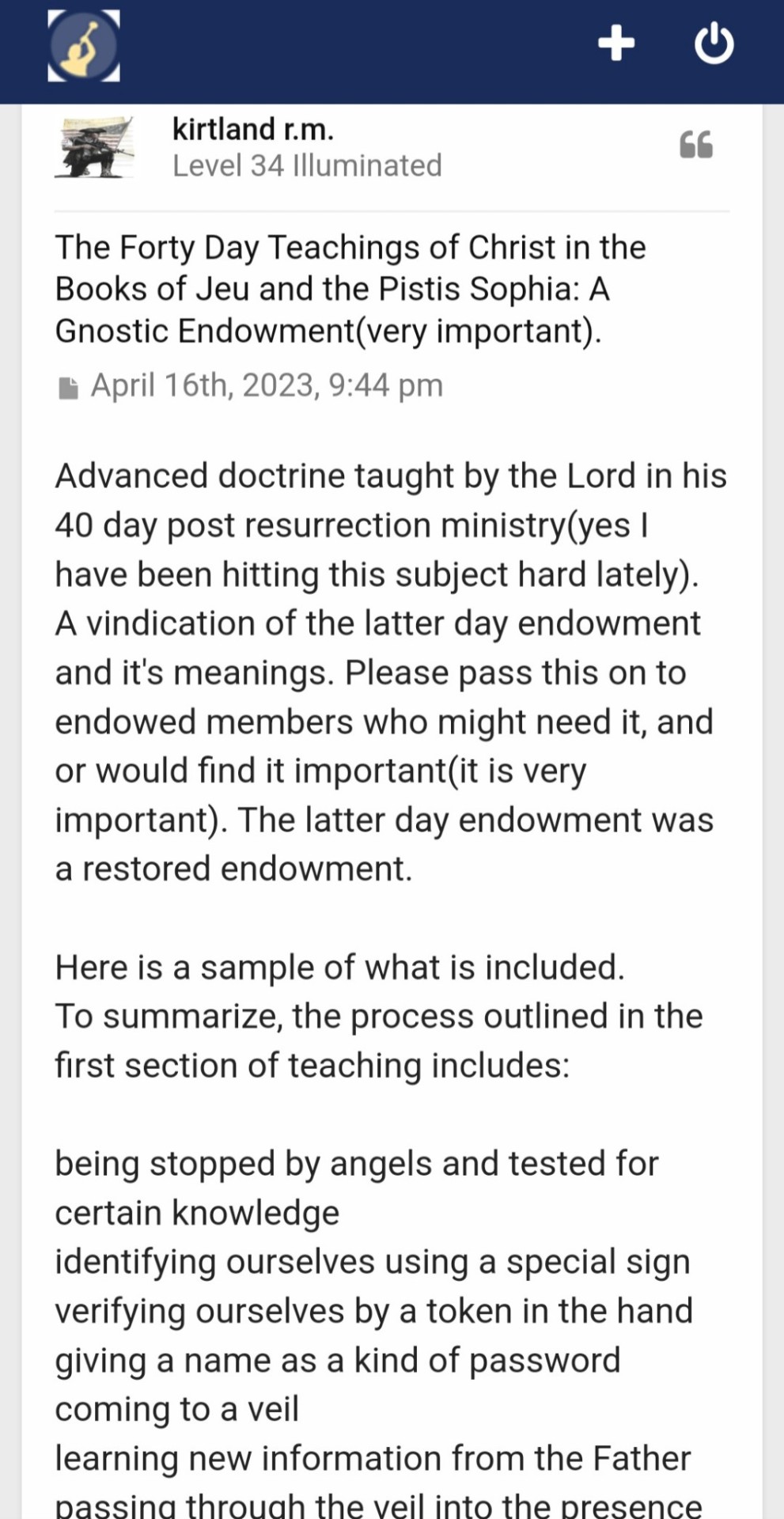
I feel like these people are spiritually haunting me.
First of all, best of luck using Gnostic scriptures to "prove" your goofy cult. Most of them are lists of angels you have to memorize or you won't get reincarnated. This is like using a witch's cookbook to try and prove how chemtrails are real.
Second of all, the Jesus in the Gnostic scriptures is sarcastic and probably a ghost, and spends most of the time trying to tell everyone how God is in fact the devil and that's why the whole Old Testament doesn't matter. How the hell is that consistent with "he loves the kind of Jews who are now white people the most"?
Plus if you are a Mormon and you are aware of Gnosticism...just become a goddamn gnostic. It has the same amount of exclusionary mystery rituals and wacky mythology, but at least isn't inherently racist or sexist or centered around a very profitable grift.
But aye, there is the rub!
...Can't even enjoy Wizard Jesus without Utah ruining my fun.
If Joseph Smith had known about Gnosticism, he would have hated it. A decentralized personal faith that usually centers on a feminine creative force and is largely pro-celibacy? He would have thrown up unto his hat!
5 notes
·
View notes
Text
i likely won't get into genshin but it's probably for the best. bc from what i know abt the lore and world etc i will become the most annoying person in the world if i did
#like all the kabbalah and gnosticism stuff. so many things being named in hebrew or inspired by jewish mythology. etc#also symbolism. i love symbolism#my husband often shows me theory videos abt it that i don't understand at all but i do understand the context of. does that make sense#like the most recent one he showed me was abt childe being the embodiment of daat or smth like that#and while idk much abt him. i do know quite a bit abt daat! so ig i do know some stuff abt him too as a result.#annoying to see goyische english speakers write these theories and get the little details and pronunciations wrong tho :P#but anyway yeah gi mutuals if you have questions abt terms like this i'm happy to help find answers to them.
3 notes
·
View notes
Text
Here's something that, while I don't necessarily think is true, think is fun: what if The Truman Show is a gnostic retelling of the Book of Jonah?
God specifically picks Jonah to enlighten the people of Niveneh; Truman was picked by Cristoph kinda at chance to live a uniquely unenlightened life among the enlightened people of Seahaven.
Jonah threw himself into the sea to spare the sailors he was on the boat with; Truman "kills" his father by insisting that they keep sailing, leading to his father to be cast into the sea.
Combining these two, while it was the casting of lots that revealed to the sailors that Jonah was to blame for the storm and God's wisdom that chose Jonah as a prophet, it was Cristoph's wisdom to kill his dad and random chance that Truman was the first of the unwanted babies to be born into his life of confinement.
Jonah's purpose in traveling to Niveneh was to preach to them and thus spare them from God's destruction. When Truman leaves Seahaven, it's logical to assume that the entire "town"'s populace is now out of a job. Truman brought destruction at the cost of his own enlightenment.
God purposefully reveals himself to Jonah to show him that he's special. It's a series of accidents that stem from mechanical negligence/general sloppiness (the "star" falling from the sky, the rain that follows only Truman, the radio picking up on the production crew) that reveals Truman is special.
At the end of the Book of Jonah, Jonah falls into a deep depression and scorns God, retreating to a cave and waiting to die despite succeeding in saving the masses of Niveneh. At the end of The Truman Show, Cristoph (who is famously withdrawn) scorns Truman for gaining enlightenment and getting ready to start his real life, outwitting the denizens of the false world of Seahaven.
0 notes
Note
Have you ever seen the show Revolutionary Girl Utena, and if so, thoughts?
Hmmm, funny you should mention that. I haven't seen it and don't plan to – it's got a few too many squicks for me – but I've read some meta. I don't think I can say I know it well enough to really talk about, though.
#the symbolism gnostic themes and pivotal moments in lesbianism intrigue me#it went off with the prince-princess thing and the literally drawing a sword from your gf's chest also#unfortunately it shall have to remain a show i go 'ah. so it's like that is it?' at from a distance#answerin' stuff
0 notes
Text
I think in some demiurge strains we could use the concept of the malevolent demiurge as a narrative tool. if you take into consideration that if you are inherently evil and this place is inherently evil then why? Why should you take care of yourself and why should you take care of the earth? It places humanity in a sort of vaccum of centricism. Where one of the end goals could be to be better than you were before.

#lol i was watching a video on the history of yaweh#its with justin sledge#within reason podcast#i was not leaving this comment in the YouTube video#narrative#gnosticism#occult#plato#valentinus#listen listen listen#is it not so inherently human to want to be better#the indomitable human spirit#gif#the good place#lol that show is like one of the only shows i think made philosophy fun#it came out right when i was in philosophy class and i was like hey i know that one hey i know that one
0 notes
Text
I woke up with this idea for a cosmology that I might could write about:
God is a plagiarist
A little like the gnostic idea of there being a hidden God and a malevolent God , but it's the the hidden God that made everything, and the malevolent God is the one that's been hanging around humanity the last dozen millenia.
Hidden God made the universe, created the stars and the darkness, the land and the sea, the plants, animals, and humans. The celestial spheres where set in motion by them, and then they went away. To create more elsewhere? Maybe, probably. But they're not around anymore. They left our plant and species to fend for ourselves, knowing we'd manage with the gifts* they gave us.
And then another God showed up to the unsupervised earth and started yelling at prophets, telling them He made the universe and everybody needs to worship him. He's the one who came up with the garden of eden story, who wrote the 10 commandments, who eventually sent Jesus to bring salvation to humanity.
But he lied. He didn't make us. He may be a God with all the powers that implies, but he just showed up to a bunch of hairless apes who were wondering where they came from and yelled "oh I did it. I'm your daddy, I made you all!"
I dunno what to do with this story idea. I'm not sure where it could go at the moment. I'll have to let it stew a while.
* the unique gifts of Homo Sapiens Sapiens are not "intelligence" and "wisdom" as some might assume, but are canonically "cooking", "baseball", and "walking for a long time**"
** my phone wanted to say the third one is "butt boy". No...
802 notes
·
View notes
Note
Sorry if this has been asked already, but I had the thought today that, given how western philosophy pre-Christianity valued knowledge so highly, there must have been some group who venerated the biblical satan as a provider of knowledge.
Assuming that I am absolutely not the first person to have this idea, do you have any resources where I could learn about such groups?
That's kinda sorta an idea that shows up in Gnostic literature. In some texts, it's actually Sophia, or Christ who appears in the garden of Eden to give Adam and eve knowledge of salvation.
Iirc that's in the Apocryphon of John.
202 notes
·
View notes
Text
Digimon Adventure Tri: why it's more than you think
Originally posted on Reddit.
I believe Digimon Adventure Tri deserves a more careful, emotionally attuned rereading. I'm not here to claim absolute truth. I just want to share what I understood and felt, hoping this might encourage viewers to see the work through a different lens, especially if they're open to reevaluating it.

Tri isn't broken, it's fractured on purpose
Tri is not a classic sequel. It doesn't try to replicate the adventure spirit of the original series. Instead, it dares to explore a more introspective and emotional space. I've read some people saying that there are many subplots. But if you pay attention, everything that seems scattered is actually tied together by one common thread: the dissonance between who they once were, and who they begin to be when life stops giving easy answers.
I understand that not everyone wants to see their childhood characters grow up. That's valid. Sometimes we'd rather keep them frozen in time, running across the digiworld without ever facing heartbreak or existential crisis.
But Tri proposes something different.
It doesn't ask us to return to who we were, it asks us to acknowledge that we've changed. It shows that heroes can hesitate, that bonds can shift, and that searching for meaning is part of the fight too.
I find it moving that these characters have grown, that they're still evolving, each in their own way. That gives me hope. Because evolving doesn't always look like a flashy transformation. Sometimes it looks like staying, questioning, choosing not to run.
And if this stage doesn't resonate with you, that's okay too. Maybe it wasn't your moment. Or maybe your connection to Adventure lives on a different plane.
The beauty is that nothing takes away what came before or what comes after. It just gains new layers over time.
An emotional, not conventional structure
Tri doesn't talk about an external enemy. It speaks of an internal fracture.
From the very beginning, it tells us:
“Demiurge, the soulless creator... Idea, the true form of the world...”
This isn't just poetic dressing, it's the story's thesis. The Digital World was created as a system, but one that never truly understood the beings it would hold. The infection corrupting digimon isn't just a virus. It's a metaphor, a crack in the digital soul.

Tri doesn't follow the traditional "adventure-enemy-digivolution" formula. Its core conflict often comes in silences, glances, inner contradictions.
What hurts isn't always what happens. Sometimes it's the feelings too complex to name.
Taichi hasn't lost his courage, he's transformed it into responsibility.
Yamato isn't angry for drama's sake, he's frustrated because he doesn't know how to reach Taichi anymore.
Sora doesn't fade, she's depleted from holding everyone together while forgetting how to hold herself.
Joe isn't a coward, he's the first to confront doubt.
Mimi isn't shallow, she's defending her authenticity in a world that tries to mute it.
Koushiro isn't just the genius, he's a child who made logic his shield to avoid emotional collapse.
Takeru isn't just the optimist, his quiet strength is how he doesn't get pulled under by others' pain.
Hikari isn't just light, she's a channel. Her sensitivity connects her to the invisible, but it also makes her deeply vulnerable.
Meiko isn't a mistake, she's the weight of quiet guilt and undeserved blame.
Himekawa isn't a villain, she's a warning, consumed by a love that couldn't let go.
Nishijima isn't a mentor, he's a man who regrets arriving too late.

A symbolic reading of the Digital World
Tri challenges the Digital World's mythology. It introduces concepts like the Demiurge (imperfect creator) and Idea (true essence), pulling from gnostic and platonic philosophy. The infection is not just a digital bug. It's the result of a world built without understanding the emotions that would one day inhabit it.
Distortions in space, corrupted binary code (like the unexplained "2" in a system built on 0 and 1), the merging of realities, and the appearance of soulless replicas like Imperialdramon, none of it is random. It all speaks to a world collapsing from within, not due to external battles.


A quiet story of transformation
At the beginning of this story, Taichi wants to bring everyone back together, but time has passed. They've taken different paths, changed in ways that aren't always compatible. It's not about caring less. It's about learning that closeness sometimes fades without meaning to, and that trying to reclaim it isn't always simple.
A common criticism is that Taichi now hesitates and that this is regression.
Taichi's hesitation isn't fear, it's awareness. A pause. A question: can I still protect, without hurting anyone?
This isn't a contradiction, it's a continuation.
Let’s go back to Adventure:
Episode 16: SkullGreymon emerges from his recklessness
Episode 19: Sora was kidnapped because of him
Episode 45: his leadership fractures the group
Episode 48: we see him doubt and we learn the origin of his guilt, blaming himself for Hikari's near death as a child.
02 never explored that aftermath. The story shifted focus to a new cast. But Tri picks up that thread and now Taichi isn't afraid of danger, he's afraid of causing harm. That’s not cowardice, it's growth.
And in that pause, we glimpse the roots of the future Taichi, who will one day become a diplomat, working for coexistence between humans and digimon.
Yamato doesn't understand the change, and he pushes, hoping to ignite the old spark. But underneath the anger is the fear of losing a connection that once felt unbreakable.

Meanwhile, the Digital World is fracturing.

Not from outside danger, but from the blurring lines between emotion and system, past and present, role and identity.


Soulless Systems
These aren't classic "villains":
Yggdrasill is not an evil mastermind or alien invader. It's a symbolic, near-divine system that governs without empathy. Cold, logical, and utterly disconnected. It never appears because it doesn't need to. Its will is carried out through proxies like Alphamon, corrupted Gennai, and even manipulated humans. Yggdrasill represents the idea of a creator that has lost touch with its creation, a divine absence rather than a presence.
Alphamon is not an enemy. He's an executor without voice or motive. He doesn't speak, doesn't hate, doesn't choose. He deletes threats because that is his function. He is kind of a ghost in armor, a weapon with no soul, following the will of a broken god.
Homeostasis is not the "good side". It's a system that seeks balance. A bodiless, emotionless protocol whose only priority is to restore order when chaos threatens to collapse the Digital World. It doesn't act out of empathy or cruelty, it simply follows its function. It doesn't shift because it changes its mind, but because its compass is not moral, it's systemic. It speaks through vessels (like Hikari) and intervenes not with force, but by rebooting what’s broken to restore balance.
Hackmon / Jesmon is not a friend or foe. He is the system's messenger. He watches from the shadows, especially focused on Meicoomon, whom he perceives as a destabilizing anomaly. But Hackmon doesn't act on feeling. He is the voice of Homeostasis. Its blade. And when observation is no longer enough, he digivolves into Jesmon. But Jesmon is not hope, is protocol. A final measure. He doesn't come to save, he comes to execute.

When the system doesn't grasp the soul
In a world where connections become unpredictable, systems try to fix what they don't understand.
But emotions can't be repaired or deleted with code.
It's there, amidst reboots and algorithms, that the chosen children must decide whether to obey or to choose.

Meicoomon, a rift in the soul
Meicoomon isn't just an infected digimon, she contains Libra, which can't be controlled or regulated.. Her bond with Meiko is the most fragile, yet it's also honest.
Meiko, a chosen child who struggles to understand and bear her role, still chooses to stay. She remains, even when she feels she's the source of the pain, and even when her presence brings discomfort to others.


Libra, the code sealed in the soul
Libra is more than just a virus or a system error. It's an anomaly within the code, a burden sealed within Meicoomon from her origin. Imagine it as a living archive, holding the emotional record of the Digital World before its reboot: light and shadow, order and chaos.
To safeguard this data, it was encrypted inside her, unbeknownst to her and beyond her capacity to handle.
But Meicoomon was not created to carry such a burden. Her sensitivity and natural instability made her vulnerable to that information. It overwhelmed her, turning her into a contradiction of innocence and chaos.
Libra is not her fault. It's the Digital World's doing for putting such a heavy burden on a digimon who simply deserved to exist.


The Reboot: resetting isn't healing
The reboot wasn't a mere narrative whim or an attempt to "fix" the Digital World. It was an emergency measure. The infection had destabilized the system so severely that Homeostasis executed its last resort to restore balance: a complete reset.
This reboot came with an incredibly high cost: the loss of memories, of everything shared between the chosen children and their partners.
It wasn't an act of malice, but one of coldness. A systemic protocol that simply doesn't account for emotions. For Homeostasis, a bond is just another variable in the equation of balance.
Some criticize the reboot for "failing" because Meicoomon remained infected. But that's precisely the point: Libra wasn't a superficial error. It was a deep rift, inscribed in her soul. It wasn't just digital, it was existential. And that can't be erased with a reset. Systems can be rebooted, but the soul cannot.
Yet, even though the reboot failed in its ultimate goal, the most valuable outcome was this: even without memories, without data, without prior programming... the bonds found their way back. Because some connections don't depend on memory. Some encounters transcend code. When the soul recognizes another, it doesn't need reasons. It simply responds.

Tri shows us that some connections can't be explained, they can only be felt. These are the bonds that endure, even through forgetfulness and loss.
And it's within this very mystery, something that completely eludes rigid systems, that the emotional and the intangible begin.
The "canon" isn't broken, the story has layers
The absence of the 02 kids has been one of the most persistent criticisms of Tri. However, from the first episode, their disappearance is presented as a deliberate choice, not an oversight. It's not a case of forgetting or erasing them. It was about narrowing the focus. Also, a narrative void designed to generate uncertainty, and that uncertainty is a key part of the emotional tone the story aims to convey.
Alphamon defeats them off-screen, and while this bothers their fans, it also emphasizes a crucial point: this isn't their story. It's the story of the original chosen children. Of those who are drifting apart and question if they are still the same people. Himekawa deceives them, telling them everything is fine, much like the system watches them silently. This manipulation also reflects an uncomfortable truth: sometimes, we grow up believing everything remains as it was, until it no longer does.
And when Imperialdramon appears in Episode 8 “Determination - Part 4”, it does so as a shadow. Not as the return of a beloved digimon, but as an anomaly. Daisuke and Ken aren't there. There's no digivice, no connection. It's a silent replica that attacks as if the Digital World were projecting a broken memory.

Could the pain of their absence have been explored more deeply? Maybe. But Tri chooses to focus its lens. It doesn't erase or contradict, it simply pauses at a different stage: the stage of those who are present. Those who, without intending to, also somewhat disappeared from themselves.
Perhaps Tri wasn't created to please. Perhaps it was created to make us feel.
Not all errors are failures
Tri isn't perfect. There are narrative moments that could have been more polished, and even the technical aspects of the art could have been refined. Yet, as a whole, it's a work that takes risks and proposes new ideas. It shifts the focus from "what happens" to "what we feel".

And for a series built on emotion and evolution, that might be one of the most natural next steps it could take.
What Tri tells us (if we dare to listen)
Tri shows us that growing up isn't just about leaving things behind, it's about relearning who you are when everything changes.
It shows us that sometimes, bonds break without anyone being at fault.
It reminds us that you can't always save another person, but you can stay, watch, feel, and simply be there.
And above all, Tri makes us realize a powerful truth: that bonds, even if they fade, change, or cause pain, are still what makes life truly meaningful. Because to feel, to doubt, to make mistakes, and to try again with another, that is truly to evolve, and it's absolutely worth it.

Recommendations for a better viewing experience
Divide it into chapters. I know Tri was originally released as OVAs, but you might find it on platforms like Crunchyroll, which divides it into episodes. This makes it easier to digest its emotional pacing.
Watch at least these prequels beforehand: Digimon Adventure, Our War Game and Digimon Adventure 02. Not because they're strictly mandatory, but because I think Tri is in direct conversation with the memories and events of those stories.
Choose the original japanese audio with subtitles. The dubs (especially in english and spanish) often contain significant errors that distort the emotional message. The original japanese voice acting is also rich with subtle nuances.
Avoid external noise. Don't let soulless criticisms or external expectations contaminate your experience. Watch Tri with a clear mind and open heart. Let the story unfold and speak to you, at your own pace, in your own way.
If it helps, approach it as a side story. Think of Tri less as a continuation and more as an exploration of this particular stage in the original Adventure kids' lives.
And if Tri wasn't for you, that's perfectly fine. Don't worry. It doesn't ruin anything, and it doesn't change anything. You can simply choose to omit its existence, or you can enjoy the layers it adds as it leads us toward the epilogue of Adventure 02.
Thanks for reading. If Tri also stirred something within you, offered you comfort, or left you with questions... it's truly wonderful to inhabit that space with you.

#Digimon Adventure Tri#Digimon Adventure#Digimon#Taichi Yagami#Yamato Ishida#Sora Takenoushi#Mimi Tachikawa#Koushiro Izumi#Joe Kido#Takeru Takaishi#Hikari Yagami#Meiko Mochizuki#Omegamon#Meicoomon#Yggdrasill#Alphamon#Homeostasis#Hackmon#Jesmon#Maki Himekawa#Daigo Nishijima#Tri#digimon headcanons#digimon adventure headcanons#digimon meta#tri meta#tri headcanons
192 notes
·
View notes
Text
most people's knowledge of gnosticism on here is reverse-engineered from hearing shitposts about how its often the basis for jrpg worldbuilding and that kinda shows in how they only talk about the jrpg-y bits
1K notes
·
View notes
Text

Me explaining that the snake miraculous is an ouroboros bracelet, and that ouroboros represents, among other things, a never ending cycle of creation and destruction, and that the ouroboros from the alchemy text "The Chrysopoeia" being black and white might relate to a gnostic concept that's an analogous to the Ying and Yang, which in consequence can take us to the conclusion that Lukadrinette it's not only a cute ship, but it also would fit in the symbolic aspects that are more than present in the show. Maribug represents the Yang, Adrichat the Yin, and Luka | Viperion (do we have an official combination for his names?) would represent their balance. All of them fitting so well with each other, and vibing when they're together would have a deeper meaning and symbolism than just them being friends.
Oh, Lukadrinette, the ship you are.
#miraculous ladybug#adrien agreste#marinette dupain cheng#luka couffaine#ladybug#chat noir#viperion#lukadrinette#lukadrienette#ladyvipernoir#viperladynoir
175 notes
·
View notes
Text
Incantation Bowls from Mesopotamia, c.300-700 CE: these bowls are lined with Aramaic incantations and drawings that show demons being shackled and subdued; they were often buried beneath houses and cemeteries in an effort to capture malevolent spirits
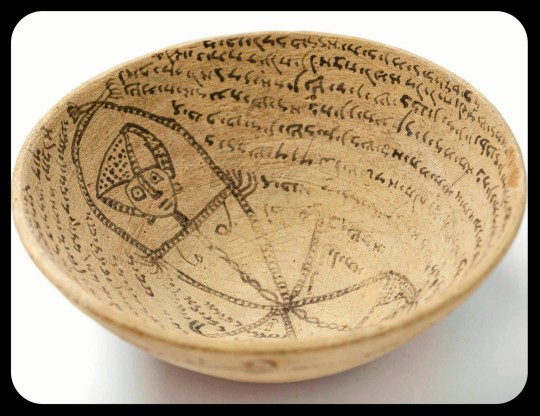
Bowls like this were once produced as magical amulets in parts of Mesopotamia (in what is now Iraq and Iran). As this article explains:
Thousands of similar incantation bowls, also known as magic bowls, were produced in the area of today’s Iraq between the fifth and eighth centuries. Clients used incantation bowls to protect and heal, to frighten off demons and evil spirits, and, in a few cases, to enlist demons to help secure love or money, or to harm adversaries. In addition to the magical texts, scribes sketched drawings of bound and chained demons – pictorial representations of the spells’ desired effect – on the bottom of about a quarter of the bowls.
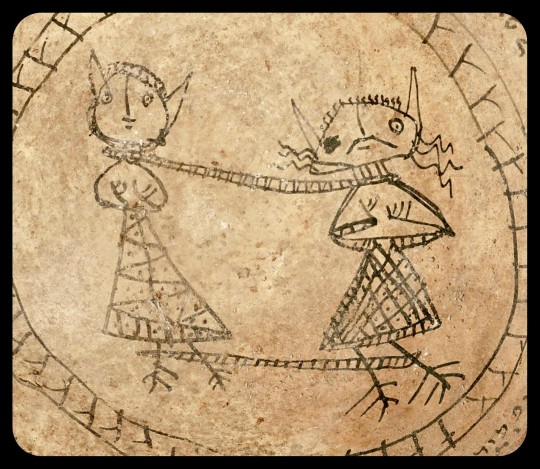
Above: this incantation bowl was commissioned by someone named Gia Bar Imma nearly 1,700 years ago, and it features a Jewish Babylonian Aramaic inscription along with a drawing of two demons wrapped in chains
These bowls were created and used by people of many different faiths. They were typically inscribed with Aramaic text, which appeared in one of three different dialects: Jewish Babylonian Aramaic, Mandaic, or Syriac. Incantations that were written in Jewish Babylonian Aramaic are, of course, attributed to Jewish communities, but the ones in Mandaic are associated with Gnostic Mandaeans, and the ones in Syriac are typically associated with Christians, Manichaeans, or followers of the ancient Babylonian religion.
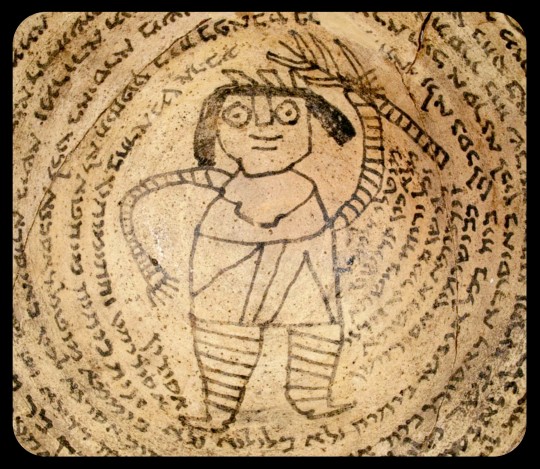
Above: this bowl is lined with an Aramaic inscription that invokes "the powers of Enoch, the seven planets, and the twelve signs of the zodiac" to protect the home of a man named Pabak bar Kufithai
There are a few incantation bowls that feature Arabic or Persian inscriptions instead, and those examples tend to have Islamic or Zoroastrian motifs. Some bowls are simply inscribed with gibberish:
The largest number of known incantation bowls are written not in Syriac, but in Jewish Aramaic by Jewish scribes (though not necessarily for Jewish clients). Mandaean bowls are the second most numerous, only then followed by bowls in Syriac. A handful of bowls in Arabic and Persian are also known, in addition to bowls – perhaps 10 per cent – that can only be called ancient forgeries. These latter are filled with scribbles that mimic cursive writing but are not, in fact, in any language at all; perhaps they were made by illiterate scribes preying on equally illiterate clients.
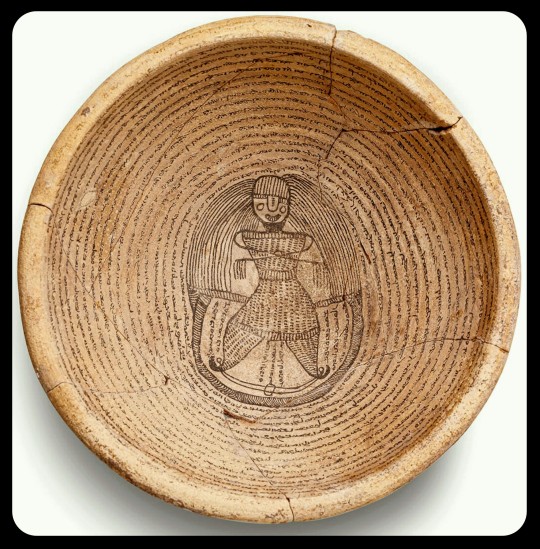
Above: this bowl features a Mandaic inscription
Incantation bowls provide valuable information about Jewish history, in particular:
The prevalence of Jewish Aramaic bowls are what makes these artefacts so important for Jewish history. They provide the sole piece of epigraphic evidence documenting Jewish language and religion at one of the most important times in Jewish history: the period of the composition of the Babylonian Talmud.
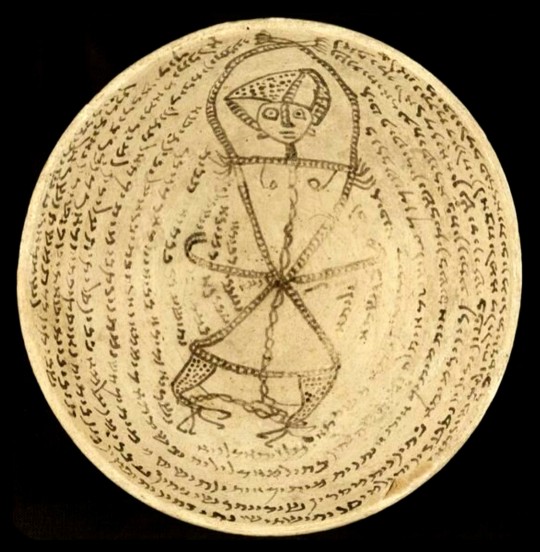
Above: researchers believe that the figure in the center of this bowl is a representation of the demon Lilith, whose likeness and/or name appears on many other incantation bowls
This article also notes:
Generally speaking, the incantations could do a number of things: healing fevers and diseases; guarding from sudden death, injustice, and treachery; and exorcising evil spirits. Similar metal talismans were made around the same time and filled largely the same role. Where they differ is that in many instances the bowls called upon deities or angels to ensnare demons. It is believed from drawings on incantation bowls depicting ensnared creatures that the reason that so many have been found upside-down is that they were intended to be traps for careless or curious demons.
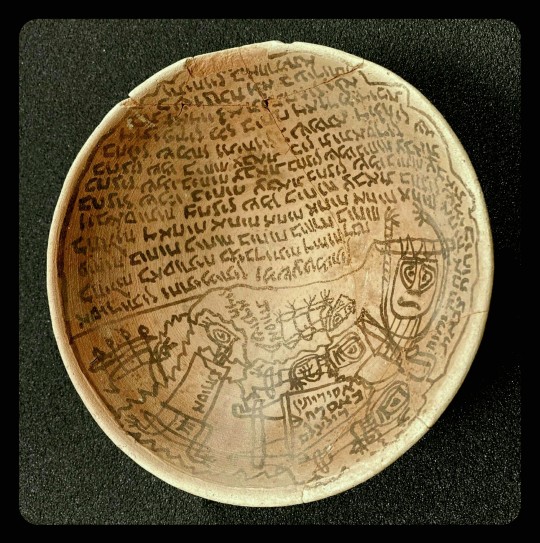
Above: this bowl has a Jewish Babylonian Aramaic inscription that includes the phrase "this cat is bound," and it features a drawing of a demonic cat being restrained
More than 2,000 of these bowls are known to exist, but only a fraction of them have been thoroughly studied.
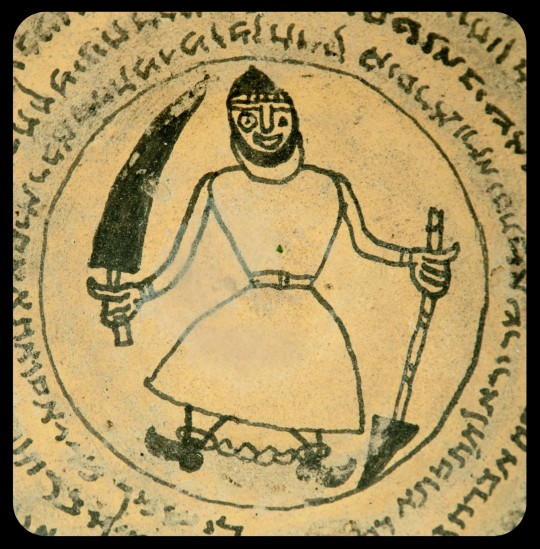
Above: an illustration from another bowl
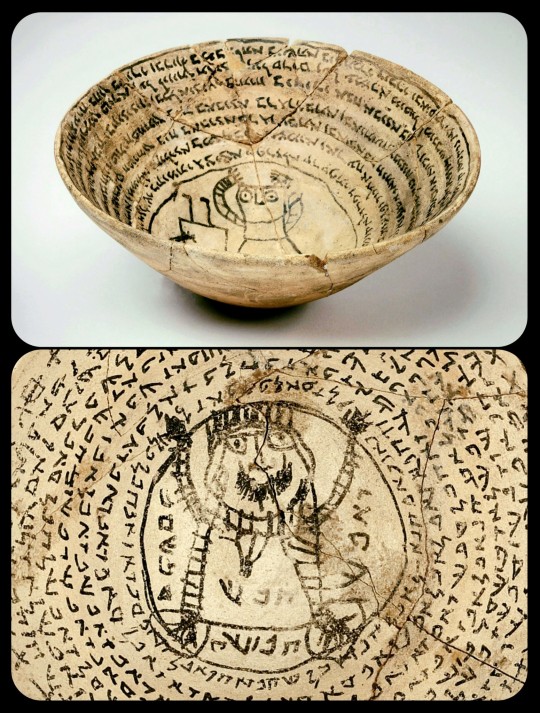
Above: two incantation bowls with Jewish Babylonian Aramaic text and drawings that show demons being restrained
Sources & More Info:
Aeon: Magic Bowls of Antiquity
Penn Today: The Stories the Bowls Tell
Bowers Museum: To Catch a Demon: Mesopotamian Incantation Bowls
Jewish Quarterly Review: Magic Formulae and Women's History: Authorship, Agency, and Gender in the Aramaic Incantation Bowls
My Jewish Learning: Magic Bowls
The Librarians: Who Wrote these Ancient Jewish Incantation Bowls?
Penn Museum: Hebrew Bowl
Journal of Late Antiquity: Enslaved People and the Demonic in the Sasanian Empire
#archaeology#artifacts#anthropology#incantation bowls#magic#judaism#jewish history#amulets#mesopotamia#jewish magic#christian magic#lilith#demons#religion#mythology#babylonian#pagan#this cat is bound
83 notes
·
View notes